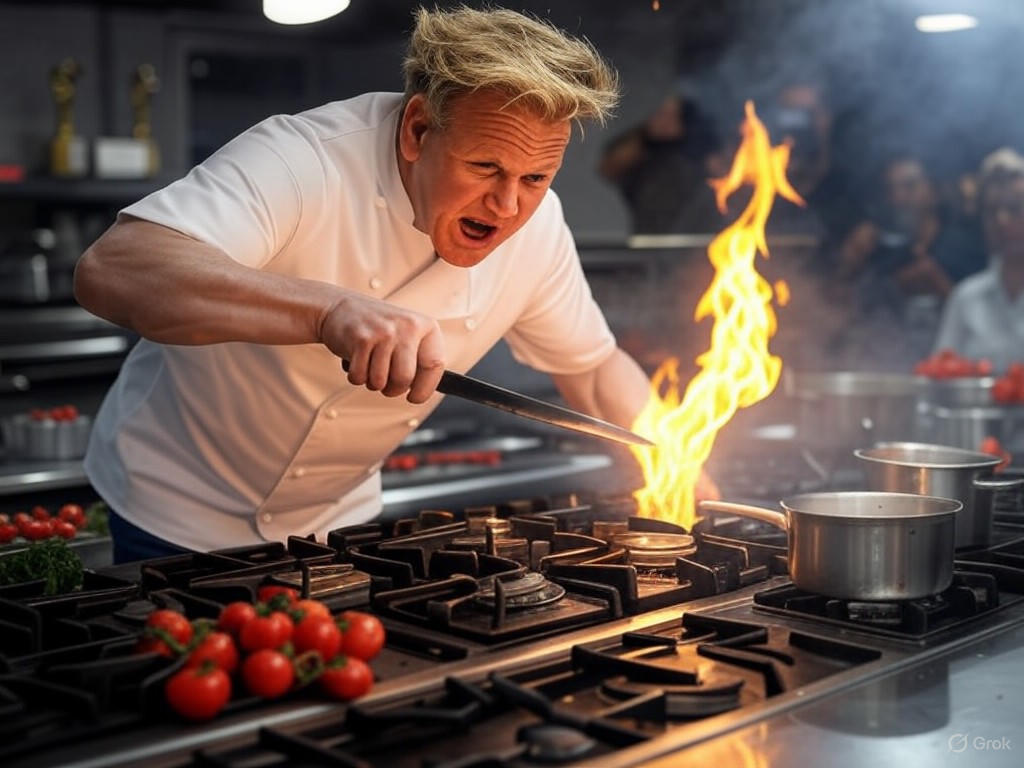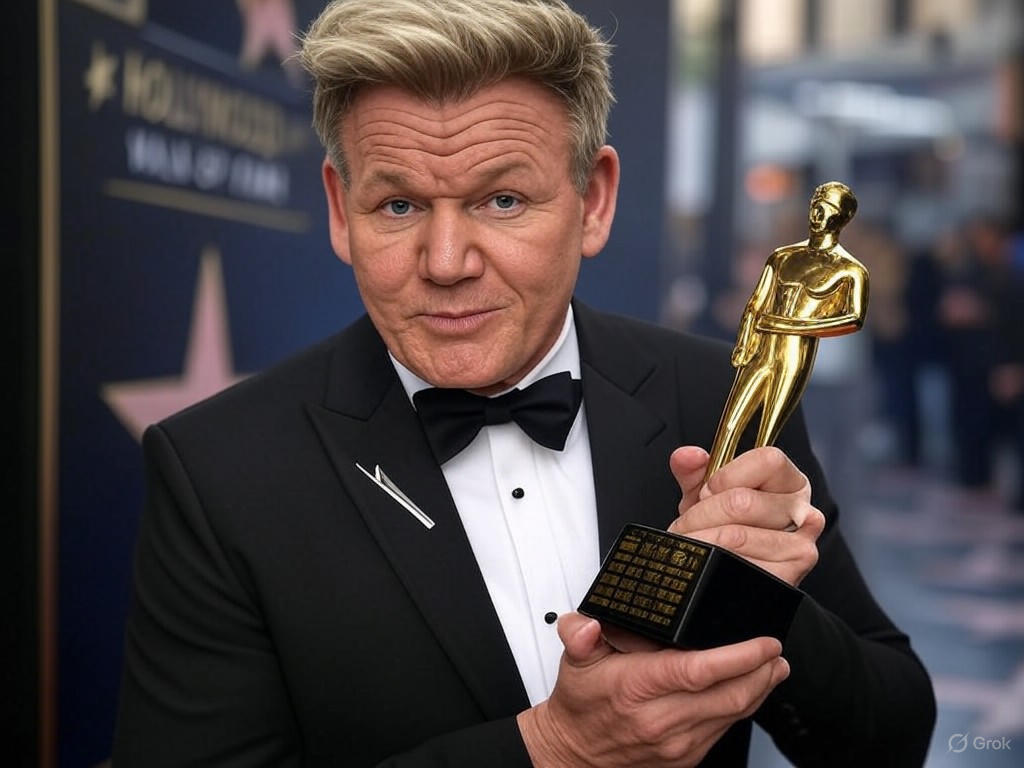Gordon Ramsay’s Cinematic Leap: A Walk of Fame Star
As the bright lights of Hollywood continue to beckon dreamers from all walks of life, few stories capture the essence of American grit and determination quite like that of Gordon Ramsay. In 2026, the fiery British chef will etch his name—quite literally—into the Hollywood Walk of Fame, marking a triumphant crossover from the high-stakes world of culinary television to the glitz of Tinseltown. This honor, announced amid a star-studded class including the likes of Miley Cyrus and Timothée Chalamet (Hollywood Reporter), serves as a beacon for those who believe in the rewards of hard work, innovation, and self-reliance. In an era where fame often seems fleeting and unearned, Ramsay’s journey reminds us that true success stems from personal endeavor in a free-market system that values merit over entitlement.
Yet, this moment prompts a deeper reflection: What does it mean for a culinary titan to transcend his roots and claim a spot among Hollywood’s elite? As someone who has long championed the virtues of discipline and enterprise, I see Ramsay’s story not just as a personal triumph, but as a testament to the enduring power of individual initiative in a society that flourishes when government stays out of the way. Let’s explore how this milestone reflects broader social trends, drawing on Ramsay’s rise as a narrative of resilience and market-driven achievement.
The Rise of a Culinary Force: From Kitchen Battles to TV Stardom
Gordon Ramsay’s path to the Walk of Fame is a masterclass in the kind of self-made success that defines the best of American—and global—entrepreneurship. Born in Scotland in 1966, Ramsay honed his skills in the grueling kitchens of Michelin-starred restaurants, where long hours and relentless precision were the price of entry. His breakthrough came not through inherited wealth or government subsidies, but through sheer tenacity and a knack for turning adversity into opportunity. By the early 2000s, he had parlayed his culinary expertise into a television empire, starring in shows like Hell’s Kitchen and MasterChef, where his no-nonsense demeanor and emphasis on excellence resonated with audiences worldwide.
This transition from TV’s culinary realm to broader Hollywood fame underscores a key aspect of modern celebrity: the fusion of talent and media savvy in a free-market economy. Ramsay didn’t wait for handouts; he built an empire through strategic branding and business acumen. According to a profile in Forbes, his global restaurant chain and media ventures have amassed a net worth exceeding $220 million, all driven by consumer demand rather than regulatory favors (Forbes). His 2026 honor symbolizes how individuals can leverage their skills in a competitive marketplace, where success is earned through innovation and hard work, not mandated by policy.

Gordon Ramsay engages in a intense culinary showdown on Hell’s Kitchen, illustrating the high-pressure environment that forged his unyielding work ethic.
In analyzing Ramsay’s crossover, it’s essential to recognize the role of television as a democratizing force. Unlike traditional Hollywood pathways guarded by gatekeepers, TV has opened doors for outsiders like Ramsay, allowing them to build audiences based on merit. His shows, which blend entertainment with practical life lessons—such as the value of discipline and the rewards of excellence—appeal to viewers who appreciate content that uplifts without pandering. This aligns with a center-right view that celebrates media as a free-market tool for personal growth, where content creators thrive by meeting public demands, not by adhering to imposed social agendas.
Evidence of a Broader Trend: Celebrity Honors and the Free-Market Meritocracy
The Hollywood Walk of Fame, established in 1958, has long served as a cultural barometer, honoring those who have significantly influenced entertainment through sustained excellence. Ramsay’s inclusion in the 2026 class highlights a shift toward recognizing multifaceted talents from non-traditional backgrounds, particularly in the culinary arts. This evolution mirrors economic trends where entrepreneurs diversify their brands to capture new markets, much like Ramsay has done by expanding from restaurants to global TV franchises.
Data from industry analyses supports this narrative. A report by The Wall Street Journal notes that celebrity endorsements and crossovers, such as Ramsay’s, contribute billions to the economy annually by driving consumer engagement and tourism (Wall Street Journal). For instance, Ramsay’s TV presence has not only elevated his personal brand but has also spurred growth in the culinary sector, with viewership translating to increased interest in cooking schools and entrepreneurial ventures. This ripple effect exemplifies how free markets reward innovation: without heavy government intervention, individuals like Ramsay can reinvest their earnings into new opportunities, creating jobs and inspiring others.
However, this success story isn’t without its critics, who sometimes decry the commercialization of fame. Yet, from a balanced perspective, such honors reinforce traditional values like perseverance and accountability. Ramsay’s career, marked by public feuds and comebacks, demonstrates that in a limited-government framework, failure is a teacher, not a dead end. As detailed in a piece from Eater, a leading food industry blog, Ramsay’s early setbacks—including restaurant closures—were overcome through adaptive strategies and personal resolve, rather than relying on bailouts (Eater). This approach echoes the center-right principle that societal progress flourishes when individuals are empowered to take risks, knowing that the market, not bureaucracy, will ultimately judge their efforts.

Gordon Ramsay receives a prestigious culinary accolade, a precursor to his Hollywood Walk of Fame star, symbolizing the rewards of sustained excellence in a competitive field.
The Implications for Society: A Call to Embrace Traditional Values
As we celebrate Ramsay’s 2026 milestone, it’s worth considering the larger public issues at play. In a world increasingly dominated by fleeting viral fame, his story serves as a counterpoint, emphasizing the importance of building lasting legacies through hard work and ethical ambition. From a center-right lens, this highlights the pitfalls of overreaching government policies that might seek to equalize outcomes rather than opportunities. Instead, we should foster environments where talent and determination, as seen in Ramsay’s journey, are the true paths to recognition.
Yet, balance is key. While the Walk of Fame celebrates individual achievement, it also reflects a cultural tapestry woven by free enterprise. Ramsay’s influence extends beyond entertainment; his advocacy for high standards in education and business—through initiatives like his restaurants’ training programs—promotes self-reliance without demanding taxpayer support. As noted in a BBC News analysis of celebrity impacts, such figures inspire younger generations to pursue vocational excellence, contributing to a stronger, more resilient society (BBC News).
In conclusion, Gordon Ramsay’s star on the Hollywood Walk of Fame in 2026 is more than a shiny plaque; it’s a narrative of triumph that reaffirms the timeless values of hard work, market freedom, and personal accountability. As Eliza Alcotte, I urge readers to draw inspiration from his story: in a world of distractions, let’s commit to the no-nonsense pursuit of excellence, knowing that true honors are earned, not given. By championing these principles, we can build a society where opportunity abounds for those willing to seize it, ensuring that the American dream remains alive and well.

